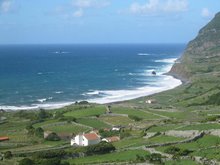If there’s one thing that gets on my wick – I’ll rephrase that – of the dozens of things that get on my wick, one of them is people who say things like “I’m no lawyer but ...” and then proceed to launch upon a very complicated legal argument and make a plonker of themselves.
That’s the equivalent of me saying “I’m no brain surgeon but I've watched enough episodes of Holby City and one thing I do know is you should never cut the cranial nerve before you’ve sutured the ...”
The latest offender to pass under my radar is a chap called Stuart Hill. He has declared an island the size of a tablecloth in Shetland (in the channel between Papa Stour and the Mainland of Shetland to be exact) called Forewick Holm the independent “Crown Dependency of Forvik”. This is what it looks like on Google Earth:-
That’s the equivalent of me saying “I’m no brain surgeon but I've watched enough episodes of Holby City and one thing I do know is you should never cut the cranial nerve before you’ve sutured the ...”
The latest offender to pass under my radar is a chap called Stuart Hill. He has declared an island the size of a tablecloth in Shetland (in the channel between Papa Stour and the Mainland of Shetland to be exact) called Forewick Holm the independent “Crown Dependency of Forvik”. This is what it looks like on Google Earth:-
 And this is the flag of the Crown Dependency:-
And this is the flag of the Crown Dependency:-
As I understand it, Stuart, an Englishman (i.e. not a native Shetlander) with a beard you could lose a badger in, professes loyalty to the Queen but not to the UK. This was all given a huge draught of the oxygen of publicity on that rather nice programme on the tellybox with Martin Clunes (for my non-British readers, a TV actor) going round British islands which involved such pranks as Martin having his passport stamped as he disembarked on Forewick Holm/Forvik from a rowing boat etc. Stuart also attempts to defy the pretensions of British sovereignty in Shetland by such stunts as not sending in his UK Tax returns (for which he’s been fined by HMRC) and putting an old Landrover on the road on the neighbouring Mainland of Shetland with a Forvik number plate and tax-disc (although, importantly, he has not attempted to drive said vehicle and all that’s happened is the thing got towed away as constituting an eyesore). He’s attempting to goad the British authorities into crushing Forvik’s pretended independence and, quite sensibly, they’re not rising to the bait.
You can read all about it on http://www.forvik.com/. It’s all harmless fun and it seems that the authorities in Shetland have responded with the good humour these eccentricities call for but Stuart Hill genuinely believes that Shetland (and Orkney as well, I think) are not part of the UK due to quirks of history 500 years ago.
He’s seizing on – and trying to make too much of – the fact that, in the mid-15th century, Orkney and Shetland were still part of Norway. In 1469, the King of Scots, James III, was getting married to a daughter of the King of Denmark who also happened to be the King of Norway. That called for a dowry but as the King of Denmark/Norway couldn’t actually lay his hands on the stipulated number of gold florins or whatever, he pawned Orkney and Shetland to Scotland pending being able to raise the readies. As it happened, Norway never coughed up to redeem the pawn and Orkney and Shetland have been Scottish (British from 1707) ever since.
As Stuart says on his website: “My research over the past 6 years or so into Shetland's unique history leads me to the inescapable conclusion that it [i.e. Shetland becoming part of Scotland/The UK] never happened - and that it could never have happened. If I am right (and so far, nobody has proved me wrong), the implications are simply huge.” Well allow me to be the person who proves you wrong. The following is a text of a message I left in the Guestbook of Forvik.com:-
"Stuart
"We’re all entitled to our lifestyle choices and “English Eccentrics” stamping Martin Clunes’ passport makes for great television but as for your legal arguments on UK sovereignty over Shetland I have to say this:-
"It’s one thing to take a political standpoint that Shetland should be independent of the UK (or Scotland). I have no view on that personally but if the people of Shetland were to vote unequivocally for independence, then I expect the politicians in London and Edinburgh would take due account of that as a political bridge to be crossed when they come to it. I do not dispute your right to advocate Shetland’s independence meantime.
But your “legal” arguments that Shetland has never have been part of Scotland or the UK are – apart from being politically irrelevant – bunkum, not to put too fine a point on it.
"I’m always amused when people say “I’m no lawyer but ...” and then go on to advance esoteric legal arguments. Well I am a lawyer (retired now) and I what I would say is this:-
"Your three letters – CCT – conquest, cession, terra nullius – omit a fourth letter: P for Prescription. This is the legal principle that, irrespective of how dubious a claim to sovereignty may have been to begin with (the pledge for the dowry in 1469, the Act of Annexation in 1472 etc. etc.), this all becomes totally irrelevant with the passage of time if Scotland/the UK asserts its sovereignty and Norway/Denmark doesn’t lift a finger to object. I think you would have to agree that’s been the state of affairs for 200+ years, no?
"So, given that the UK undoubtedly has a sovereignty over Shetland which is not disputed (or disputable) by any other country (inc. Norway/Denmark), what is the situation as between the UK Crown and its subjects within its territory which includes Shetland? I hear all your arguments about the applicability of feudal or udal law in the Northern Isles - “I say feudal, you say udal, let’s call the whole thing off” - but what you seem to be overlooking is the legal principle called the “sovereignty of Parliament”. This is the legal concept that, as the UK has no written constitution to limit what Parliament can do, it (i.e. in practice the government of the day) can legislate anything it wants. That includes abrogating udal law in Shetland. If you need any clearer example, just look at how the Scottish Parliament (which derives its powers from the UK Parliament) abolished feudal law in Scotland in 2003. So the UK Parliament is quite within its rights to declare a state monopoly over oil under the sea-bed as far out as will not get the UK into trouble with other countries.
"In the absence of clear legislative provision, of course you can get into grey areas over the niceties of udal/feudal on the foreshore and a fish farm etc. but let’s not imagine that King James III’s dowry has anything to do with the UK’s right to licence oil exploration within its territorial waters around Scotland because that has been declared by legislation by Parliament. (I can’t name you the exact Act but I’m sure you will know it.). And as far as udalling or feudalling (calling the whole thing off) the foreshore is concerned, any debate about that can be settled by parliament if the political will exists (Was there not some Task Force into the Crown Estate recently to make recommendations to the Scottish Parliament?)
"Happy to debate this with you here or in any other forum.
Neil”
So put that in your pipe and smoke it.





2 comments:
The Duchy of Grand Fenwick, anyone?
Love it but I have been eagerly anticipating my next history lesson. It's been over a week since the broken pots!
Post a Comment